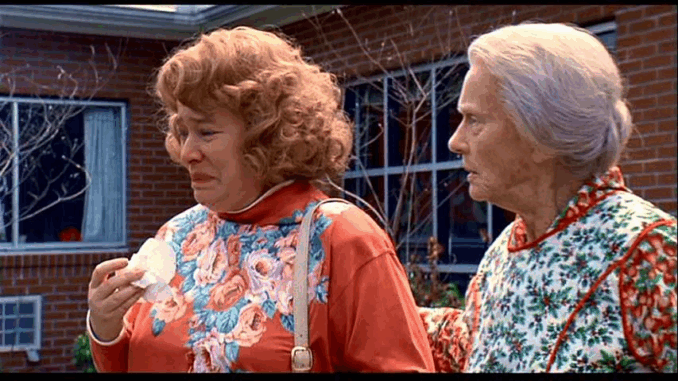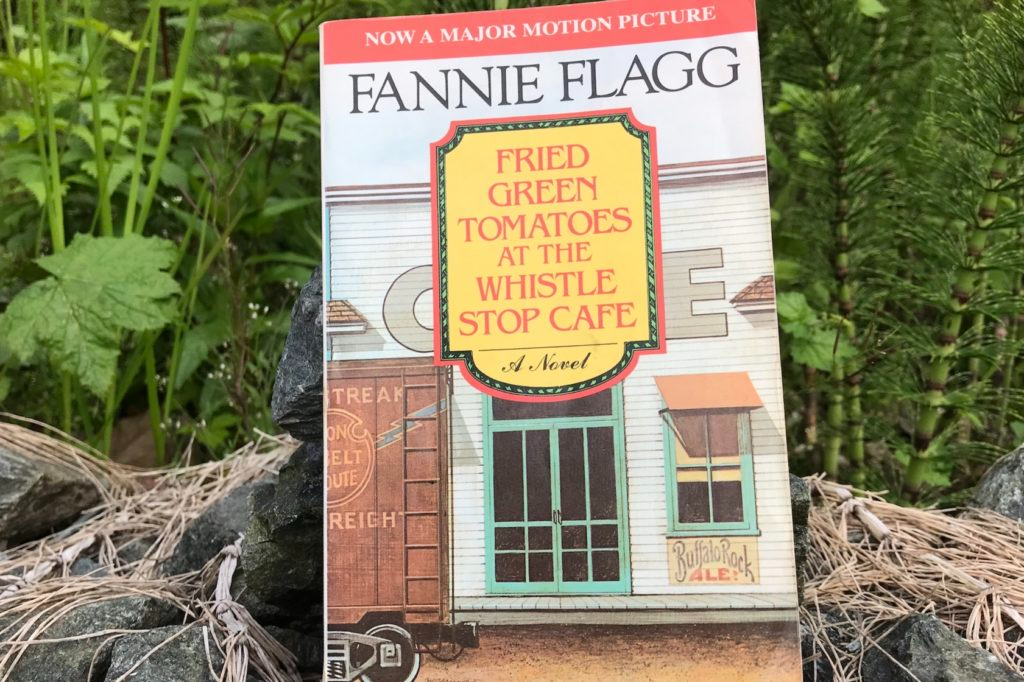
Two Women, Two Timelines, One Lifeline
In Fried Green Tomatoes, stories run parallel—one rooted in the past, where Idgie and Ruth carved out a life of fierce love and resistance, and one grounded in the present, where Evelyn Couch is quietly unraveling beneath the weight of her unfulfilled, invisible life. Binding these two timelines is a voice: Ninny Threadgoode.
Ninny, elderly and bright-eyed, narrates the tale of Whistle Stop with a twinkle of mischief and a lifetime of memory. But what begins as a series of amusing anecdotes soon becomes something much deeper—an emotional lifeline that draws Evelyn back to herself.
The final meeting between Ninny and Evelyn, late in the film, is far more than a casual farewell. It is a closing of one chapter and the beginning of another. It is the full circle of storytelling and transformation. And it is, in many ways, the soul of the entire film.
A Bond That Grew in the Unlikeliest Place
Ninny and Evelyn first meet in the halls of a nursing home—an unlikely setting for a life-altering friendship. Evelyn is visiting her husband’s relative and wanders into a room where Ninny, delightfully unfiltered and full of stories, offers unsolicited conversation.
Evelyn, lost and emotionally starved, resists at first. But Ninny’s stories of Idgie and Ruth—of trains and tomatoes, heartbreak and rebellion—draw her in. Slowly, Evelyn begins returning each week, not out of obligation, but out of need.
These visits become Evelyn’s therapy. The stories reach deep inside her—pulling at places she didn’t know were still alive. Ninny, by sharing her memories, offers Evelyn more than entertainment. She gives her courage. Perspective. And permission.
By the time we reach their final visit, Evelyn has already begun to change. She’s stronger. Louder. Fiercer. But she still returns to Ninny, needing that connection that lit her fire in the first place.
The Return to the Nursing Home: A Room Now Empty

Late in the film, Evelyn arrives at the nursing home with the hope of sharing something exciting—perhaps a story, perhaps her newfound confidence. But Ninny’s room is empty.
It’s a moment filled with dread. The viewer, like Evelyn, wonders: Has she passed away?
The silence in the room is crushing. The absence of that bright voice and twinkling laugh is deeply felt. Evelyn stands alone, uncertain and vulnerable again.
And then, the revelation: Ninny isn’t dead. She’s simply gone back to Whistle Stop.
The film gently, lovingly, lifts us from grief back to wonder.
The Journey to Whistle Stop: A Symbolic Homecoming
Evelyn sets out to find Ninny—not out of pity, but out of a need to complete something left unfinished. Her journey back to Whistle Stop is more than a drive; it is a pilgrimage.
For Evelyn, this isn’t just about checking on an old friend. It’s about honoring the story. It’s about closure. It’s about seeing for herself what’s left of the place that, through Ninny’s voice, gave her the tools to become whole again.
And when she finds Ninny there, sitting in the overgrown garden where the Whistle Stop Café once stood, it feels like finding treasure at the end of a myth.
Ninny’s Return to Whistle Stop: A Quiet Act of Belonging
Ninny’s decision to return to Whistle Stop is never explained in grand terms. There’s no dramatic declaration. But the message is clear: she came home.
In her old age, she’s seeking comfort in familiar soil. Her memories are rooted here, in the garden and streets and ghosts of the past.
What she finds is a ruin—but one full of life. It’s as if the land remembers everything she told Evelyn. And now, so does Evelyn.
This mutual return—Evelyn to Whistle Stop, Ninny to the place of her stories—is symbolic. One is coming full circle from disillusionment to selfhood. The other is gently bringing her life to a peaceful close, surrounded by echoes of her youth.
The Offer That Changes Everything: A New Chapter Together
In one of the most touching moments of the film, Evelyn insists that Ninny come live with her.
It’s not a dramatic or pitying offer. It’s given with warmth and excitement, as though asking a friend to share an adventure. And in many ways, that’s exactly what it is.
What began as a series of chance meetings in a sterile nursing home has blossomed into chosen family. Evelyn isn’t doing charity—she’s asking her best friend to come home.
This gesture is Evelyn’s way of giving back. Of taking the healing and hope she received and turning it into a new reality. For Ninny, it means security, companionship, and a place in the life she helped transform.
Legacy Through Story: Ninny’s True Gift
The real power of Ninny’s presence in Evelyn’s life is not just the companionship. It’s the stories.
Through her, the lives of Idgie, Ruth, Buddy, Big George, and Sipsey are preserved—not just as facts, but as living, breathing myths. These stories act as parables, each one offering Evelyn a tool: courage, rebellion, joy, forgiveness.
In a world that tries to silence older women, Ninny is proof of the exact opposite: that aging doesn’t make your voice less powerful. If anything, it sharpens it.
Her final gift to Evelyn isn’t just her presence. It’s a blueprint for living loudly and unapologetically.
The Emotional Aftermath: Full Circle for Evelyn
By the time Evelyn takes Ninny into her home, she is no longer the timid woman we first met. Her journey has not been about romance or career—it’s been about reclaiming her identity.
Ninny gave her stories. Evelyn gave her a home.
And in that exchange, both women win.
The final image of them together doesn’t scream “ending.” It whispers “continuation.” A new story is beginning, and this time, Evelyn gets to live it instead of just listening.
Conclusion: The Final Visit as Quiet Revolution
The last visit between Ninny and Evelyn is understated in action but seismic in emotional impact. It’s about love without romance. Family without blood. Healing without therapy.
It shows that connection between women—especially across generations—has the power to shift lives, rewrite self-worth, and alter destinies.
It’s not about saving someone else. It’s about walking alongside them, sharing stories, and being brave enough to say: “Let’s keep going. Together.”
In this way, Fried Green Tomatoes reminds us that the most profound revolutions often begin with nothing more than a visit, a conversation, and the decision to stay.
